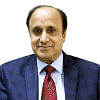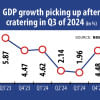How inflation control correlates with economic growth

Bangladesh is navigating through a turbulent macroeconomic landscape characterised by falling GDP growth and a stubborn high rate of inflation. The government has rightly targeted inflation control as one of its primary macroeconomic goals. Apart from its adverse consequences for investment climate and long-term growth, high inflation has huge social costs that hurts the low-income and poor sections of the population.
One of the major policy instruments used by the government to control inflation has been the interest rate policy. Following a long period of regulated interest rates, in a series of steps since December 2023, the Bangladesh Bank (BB) has lifted the limit; presently, the interest rate is market-determined. BB influences interest rates through its policy rate and monetary aggregates. The current monetary policy stance is to raise the interest rate to curb the growth of domestic credit with a view to lowering aggregate demand, thereby lowering inflation. The policy rate climbed from 6.5 percent in September 2023 to 8.5 percent in May 2024 and subsequently to 10 percent in December 2024. It has remained unchanged since then. The average lending rate climbed from a low of 7.8 percent in September 2023 to 11.5 percent in June 2024 to 12.2 percent in July 2025.
What has been the impact of this interest rate increase on inflation? Demand for private credit has fallen. Growth of public credit has also softened due to cutbacks in fiscal deficits and less use of bank borrowings to finance the deficits. Consequently, the inflation rate has shown some signs of respite. The upward move has been arrested and is now trending downwards, as inflation fell from a peak of around 11.7 percent in July 2024 to nearly 8.6 percent in July 2025. BB has announced its intention to keep the policy rate unchanged until inflation drops to three to five percent.
The slide in private sector credit growth has been sharp, from 9.8 percent in FY2024 to six percent in FY2025. This is concerning because of its negative implication for economic growth. Indeed, the decline in GDP and private investment growth, demand for capital imports, and growth of private sector credit are all interrelated. Together, they suggest that the economy may have entered a recessionary phase, which does not augur well for employment and poverty reduction.
The main focus here is to enquire about the extent to which these declining indicators of economic activities are related to the effort to control inflation through the interest rate policy. Is there a trade-off between inflation control and GDP growth?
A fully satisfactory answer to these questions requires the use of a well-developed econometric model and a thorough review of the global literature dealing with these situations in other relevant economies. Such investigations are beyond the scope of this column, so I will make some simple but logical arguments.
In any open economy, inflation and GDP growth are the outcomes of a large number of domestic and economic factors. The policy variables to influence these outcomes are similarly multiple and interactive. Interest rate is simply one such variable. There are hosts of other factors and policies that will determine the rate of inflation and GDP growth.
Regarding inflation, there are demand side factors like the interest rate, tax rate and fiscal deficit, while on the supply side there are variables like the exchange rate, international inflation, domestic production and supply of imports. So, when the interest rate rises and demand for credit falls, this tends to reduce inflationary pressure. But a rise in fiscal deficit, depreciation of the exchange rate, rise in international oil and other commodity prices, fall in domestic production, and a decline in imports can all work to offset the effects of rising interest rates on inflation. Indeed, this has been the case with Bangladesh recently. The effects of demand compression through a rising interest rate on inflation have been substantially offset by the reduction in the growth of domestic production and imports. A coordinated policy effort to lower inflation to the desired level will have to combine the monetary policy with other determinants of inflation.
The slide in GDP growth is a complex interaction of a whole host of factors. Based on my past research findings, I would argue that the interest rate hike is likely to have only a marginal impact on GDP growth. While the interest rate hike has slowed down private credit growth, it is hard to ascribe the sharp fall in private sector credit growth to the interest rate alone. The observed decline in the private investment rate and capital imports are more closely related to the substantial weakening of the investment climate due to a poor law and order situation, political uncertainties, energy shortages, continued high trade protection, high cost of trade logistics, and shortage of skills. The rapid slide in the growth of private sector credit is partly an outcome of this weakening of the investment climate.
Policy attention must shift to address these concerns. Once the investment climate improves, it is very likely that private sector credit growth will recover even with the current interest rate policy. Credit demand depends on profitable investment opportunities. The investment climate is the most important determinant of this. Interest rate is an important cost variable. At 12 percent, the interest rate looks high, but this is partly due to high inflation. Adjusted for inflation, the real borrowing rate is around four percent, which is no higher than real interest rates in India, Sri Lanka, Pakistan, Indonesia, Vietnam, and many other comparable middle-income countries.
As inflation eases, it should be possible to lower the BB's policy rate that will help lower the nominal borrowing rate for bank customers.
Dr Sadiq Ahmed is vice-chairman at the Policy Research Institute of Bangladesh (PRI). He can be reached at [email protected].
Views expressed in this article are the author's own.
Follow The Daily Star Opinion on Facebook for the latest opinions, commentaries and analyses by experts and professionals. To contribute your article or letter to The Daily Star Opinion, see our guidelines for submission.

 For all latest news, follow The Daily Star's Google News channel.
For all latest news, follow The Daily Star's Google News channel. 













Comments